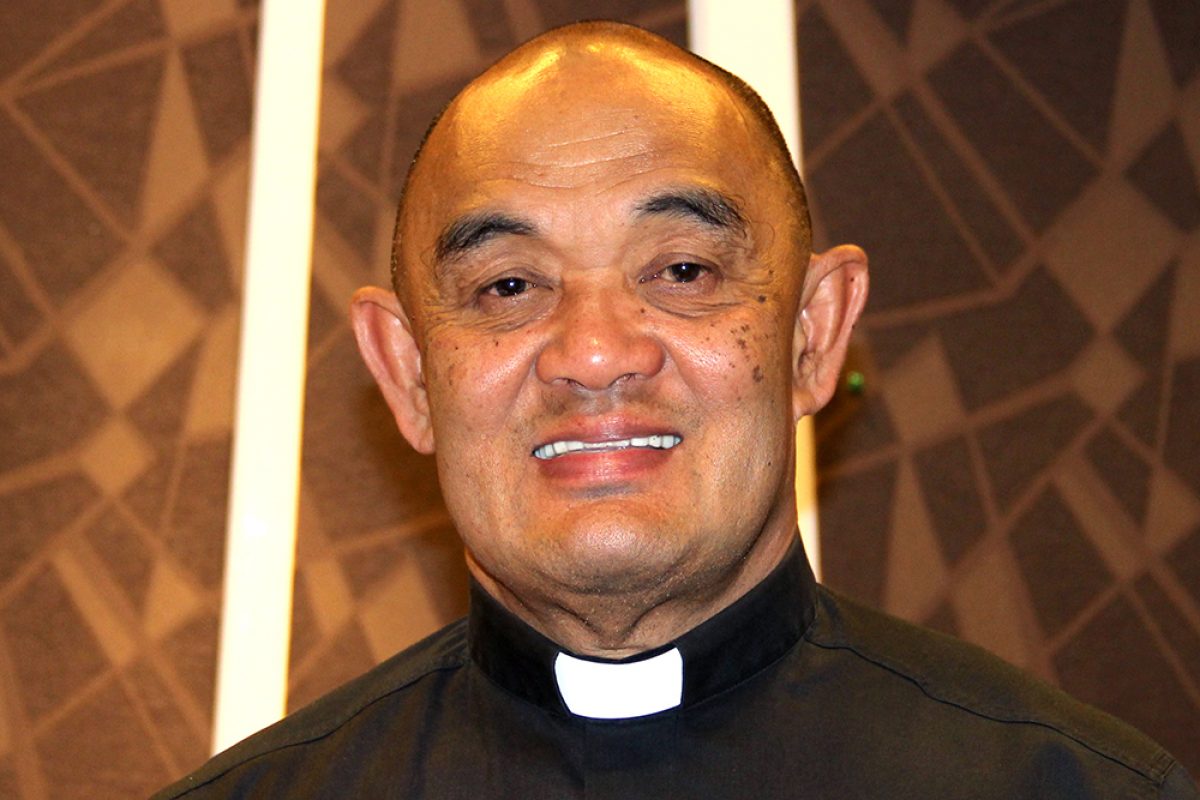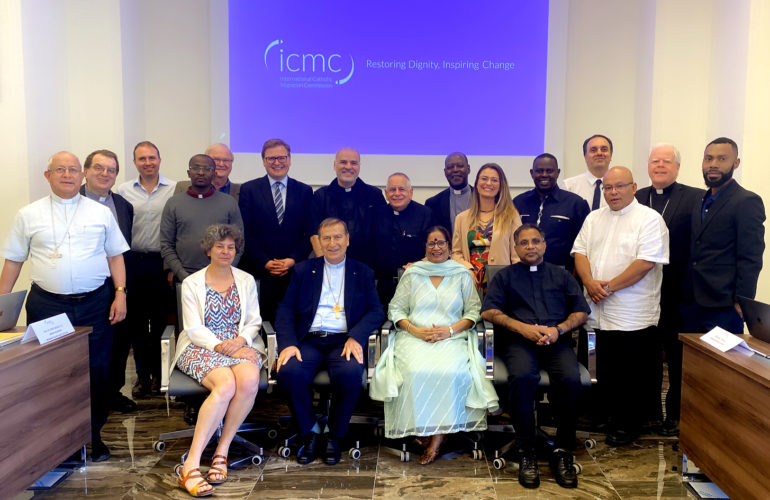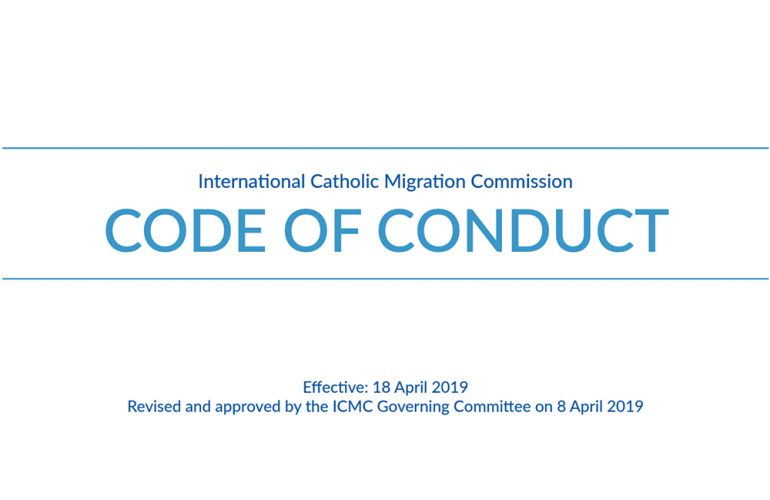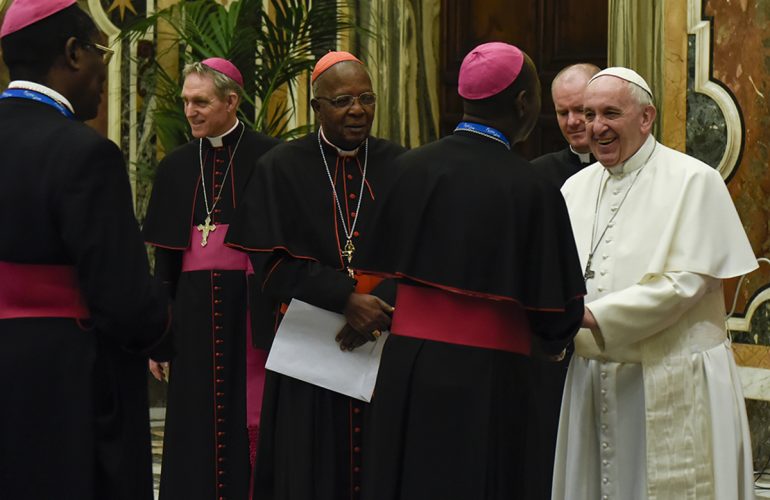God’s Language Speaks to Victims, Including Those of Climate Change

Participants at an ICMC-organized meeting in Bangkok discussed the causes of climate change and the environmental crisis. Hint: it has a lot to do with loss of connectedness between humankind and Creation as well as with greed in the global supply chain.
For Archbishop Dr. Peter Loy Chong, President of the Federation of Catholic Bishops’ Conferences of Oceania, there is no doubt that climate change is real; he has seen its consequences with his own eyes. His own maternal grandmother’s village had to relocate. “They have, over the years, moved up the hill by themselves” to escape the rise in sea level, he explains.
This increase in sea level is one of several factors with which people from the island nations of Oceania have to cope. Ocean acidification – a repercussion of the CO2 increase in the waters –, saltwater intrusion into drinking water sources and increasingly high tides are also affecting people’s everyday lives.
Food security is at risk as king tides and saltwater intrusion threatens local staple crops like taro — a starchy local root vegetable —, breadfruit and coconut, explains David Chung Hesaie, Deputy Executive Director of the Pacific Islands Association of NGOs. Fish stocks flee warming surface waters, heading deeper, making them more difficult to catch. Non-traditional foods such as imported rice and vegetables are expensive and often unavailable.
Whole islands will disappear from atolls like the ones that make up the small country of Kiribati with its average altitude of less than two meters. Population displacement leads to overcrowding on other islands and desperate migration to other parts of the world.
“Of course, they miss some things. They miss their previous surroundings like the sea. Leaving the coast means leaving a lot of cultural underpinnings,” says Archbishop Chong, who is Head of the Catholic Church in Fiji. “If they were given a choice, they would not relocate because it means leaving ancestral burial grounds and culture.”
Communities are losing their traditional land to the sea and countries wonder what will happen to the national waters once an island is submerged. Loss of maritime territory means the loss of the coral reefs, lagoons and ocean swells that make up islanders’ traditional territory and have shaped their history and culture. It can also mean the loss of fishing and mining rights that could make the nation prosperous.
A large number of young Pacific Islanders move away in search of educational or economic opportunities. But Hesaie says that this is also a consequence of climate change. Many would prefer to remain, but the effects of climate change make this impossible.
A Crisis of Interconnectedness
“We are grateful to Pope Francis for his encyclical Laudato Sì because it provides us with a Catholic teaching that combines faith, theology and science to talk about climate change,” says Archbishop Chong. He explains that Laudato Sì speaks about the interconnectedness between creation and human activity and of people’s duty to care for the environment, all concepts that are also present in Pacific Islanders’ traditional beliefs.
“It’s our framework for explaining how we are connected with creation, with plants, with birds, with the sea, with the air,” Archbishop Chong says. In a time of crisis, “we always say that there must be something wrong in our relationship and that we must make amends.”
“And so the challenge that Pope Francis puts before us is: where do we learn interconnectedness?” notes the archbishop. Both the Bible and traditional spiritual beliefs say that when God created the world, everything was in balance. “We have to reeducate people on the importance of caring for the environment.”
He believes that the key is to speak the language of God, a language that speaks to victims. God revealed himself to the victimized nation of Israel, and Jesus brought the stories of society’s victims to the center. “These stories then disrupt or interrupt leaders, so that they become aware that the world is not right for these people.
“As a Church, we need to speak the language of God that speaks to the victims, God [who] is on the side of the victims,” says Archbishop Chong. “How do you bring a voice to the voiceless people and put their voice at the center? Climate change language makes these people the center, disturbs politicians and makes them realize that something is wrong.”
Climate Change: A Global Supply Issue
Nanang Ibrahim is a coordinator for the International Young Christian Workers Asia Pacific (IYCW), an international movement for workers aged 15 to 35. The organization is mainly active in the industrial sector.
Ibrahim sees climate change and environmental damage as part of a larger supply chain issue. He describes how in his native Indonesia, chemical dies from the garment industry pollute rivers and use up underground water reserves, forcing people to buy water. Agricultural land is becoming urbanized and large-scale deforestation is taking place to create space for ever-growing industrialized areas.
Young workers are hired on short-term contracts that don’t entitle them to benefits or job security. They don’t access overtime pay or parental allowances and their contracts don’t allow them to register with the government’s social insurance system. Young people resort to taking second jobs like those of street seller or motorbike taxi driver.
In rural areas, people do not own the land they cultivate and receive meager salaries for their work. Women in particular have little chance of finding employment in their villages and often resort to labor migration, either to big cities in Indonesia or abroad.
“The problem is consumerism,” says Ibrahim. “Workers make everything, but there is no unity between them.”
Ibrahim entered the job market directly after middle school. As the fourth of nine siblings, he had to help out his parents financially. He worked in the textile industry for eight years before meeting a Young Christian Workers leader and learning about labor rights for the first time. Through IYCW evening training, he acquired computer skills, attended paralegal classes and learned lobbying, advocacy and negotiation skills.
Through his work with IYCW, he became part of a movement searching for alternatives to the global supply chain, alternatives to give Asian youth better opportunities for the future.
Examples of such alternative projects include the transformation of local coffee and the creation of sewing cooperatives, both of which allow consumers to avoid large firms and workers to find livelihoods in their region. It also includes the Clean Clothes Campaign, a global network of trade unions and NGOs dedicated to improving the conditions of workers in the global garment industry.
The young Christian workers’ four goals codify the four dreams of Asian youth, says Ibrahim: just work, social protection, gender equality and quality education for all.
Archbishop Chong, David Chung Hesaie and Nanang Ibrahim were interviewed during ICMC’s annual Asia-Oceania Working Group meeting and the ICMC co-organized High-Level Regional Conference of the Future of Work project, which took place in Bangkok from 2-4 December 2019.
The Future of Work, Labour After Laudato Sì, is a global project that allows Catholic-inspired and other faith-based organizations to contribute to the implementation of Pope Francis’ Laudato Sì encyclical in the world of work. It focuses on the labor market, dialogue with employers and workers’ organizations.
Coordinated by ICMC, the project brings together Christian business associations, international movements, local communities, Conferences of Catholic Bishops, Jesuit Social Centres and universities and organizations from other religious traditions.


